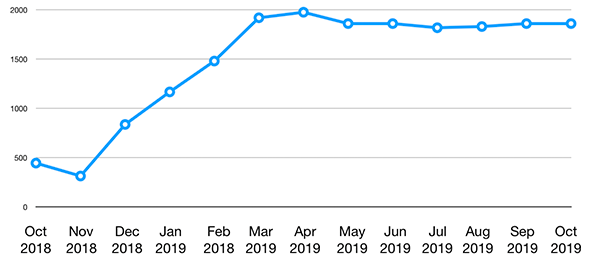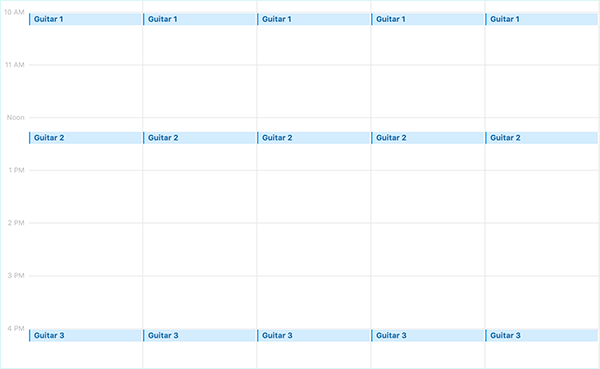Today I want to share what I have learned from two years of spending every day investing in craft — a creative practice. I know that most of the people reading this are writers, so I will frame the lessons so they benefit you most!
Show Up to Your Craft
I always feel that good marketing begins with a devotion to your craft. In other words: a writer must write. I speak to hundreds and hundred of writers each year, and I know that this is something many of them struggle with. They simply can’t find the time and energy to write.
I had that same issue, but with guitar. For a quarter century, I have made feeble attempts again and again to do this. Each time, I spent a few weeks learning a couple chords, and then stopped.
Then two years ago I decided to finally learn how play guitar.
In the first year of learning this time around, I forced myself to play every day, for at least a minute.In the second year, I upped that to a minimum of 1 hour of playing per day. This is what it looks like in chart form:

I didn’t track playing time for much of the first year, so this is only partial data. But you can see the difference between setting a goal of showing up to my craft for at least 1 minute per day vs 1 hour a day.
At a minute a day, I was all over the map. Some days playing for 18 minutes, other 3 minutes, others 47 minutes. But when I set a goal of 1 hour. That’s 31 hours of playing per month.
The first year I struggled not just to play, but to feel I was making progress. It was critical to prove to myself that even for a minute a day I pick up the guitar. But when I committed to my craft an hour a day, I saw radical improvement.
How to Find Time and Energy to Create
How on earth do I find an extra hour a day to play guitar? I’m sure you must be thinking this, and saying to yourself, “I am super busy, I don’t have a spare hour.”
With a full-time business to run and two little kids, I definitely didn’t feel I had an extra hour either. Every person is different, so I can only share how I managed to find an extra hour every day, 7 days a week.
I went to my calendar and found four 15 minute chunks of time and scheduled them as recurring appointments. Here is a random week in May of 2020 that is already scheduled:

In other words: I’m not negotiating with myself anymore. I’m showing up to the do the work. I’m putting it on the calendar. I am showing up with an appointment with my craft 4 times a day. (not shown in the calendar is my evening guitar session.)
I have found that if I treat my craft as the last priority in the day, as something I constantly need to decide on each day, that it just wouldn’t get done.
If you want to take your writing seriously, make an appointment with yourself and show up for it.
It was much easier to find little chunks of time to create. No, I don’t have an extra hour a day. But I do have a spare 15 minutes here and there throughout the day where I can practice. Oddly, those little chunks of time really do add up!
Progress Takes Time, Longer Than You Think
No one warns you how long it will take to not feel like crap about your progress in your craft. I think it was a full year and a half into this practice before I said to myself, “Wow, I know how to play guitar!” This wasn’t mastering the craft at all, it was simply realizing that I felt confident with the very basics of the instrument.
There were so many days where it just felt like my fingers would never fall into the right position. Where I would never get the right strumming pattern, in the right time, even for the most basic songs or chords.
What I kept telling myself — what I keep telling myself — is that if I show up to the guitar an hour a day, there is no way I won’t master the instrument. Sure, it will take years. But if I just keep picking it up. Even when I don’t feel inspired. Even when I feel I have plateaued. Even when it feels like it is taking too long. If I just keep picking up the instrument, progress will happen when I don’t even notice it.
Nowadays writers, artists, and musicians can easily compare their progress to others on social media or Amazon rankings. Even if you have hard data that you are not progressing as quickly as others in your craft, I strongly encourage you to stick with it. To develop the stamina and endurance to keep creating, keep sharing, keep honing your craft.
You Are Not Alone
I watch a lot of guitar instructional videos on YouTube. I realized something very powerful when reading the comments on these videos — comments from other people learning to play guitar like me.
Most people feel stuck. They feel stalled in their craft. In other words: you are not alone if this feels difficult.
Here is one comment I read (of many I have seen like this):
“I’ve been playing [guitar] for years and years, but it’s only in the last few months that the fretboard started to make sense to me beyond cowboy chords, power chords, and muscle-memorized licks.”
This was one of the biggest surprises to me. That plenty of people who may have been playing guitar for years are playing the same 5 chords and the same 3 licks over and over. Now, there is absolutely nothing wrong with that. But it was an eye opener to me to realize that a lot of the people playing in bar bands with friends are repeating a handful of the same chords and patterns.
I realized that I held myself to too high of a standard of feeling I needed to master the instrument in order to be a “real guitar player.”
It was also a good reminder that even people who know this instrument really well can feel stuck. I can’t tell you how many people I have seen share a guitar video where they are clearly amazing, at some point say “I suck — I have so much work to do to get better.”
If you are a writer struggling to find time for your craft, I hope the process I used may somehow help you. Here are some other posts I have shared about my guitar playing journey:
- What Practicing Guitar Every Day for a Year Taught Me About the Creative Success Dec 2018
- Podcast: The simple daily habit that pulled me out of a 25 year creative rut. Dec 2018
- I was stuck. This is how I got unstuck. (March 2019)
Thanks!
-Dan
